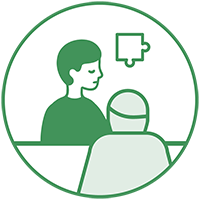- Complete a bachelor’s degree in a behavioral, social science or education field.
- Earn a master’s degree in school counseling.
- Complete graduate internship experience for certification/licensure requirements.
- Pass any required exams for certification/licensure.
- Apply for certification/licensure.
- Continue your education and stay up to date on school counseling trends and changes.
How to Become a School Counselor
School counselors play a pivotal role in promoting student success, classroom effectiveness and overall harmony within the school environment. The term “school counselor” can be used broadly to define some counseling roles in a school setting.
Although there are many roles to choose from, the steps to becoming a school counselor may be similar for those looking to work with elementary school students as well as middle or high school students. However, individual state requirements vary and are subject to change, including licensure standards, exam eligibility and appropriate pathways. Criteria also may differ based on individual student backgrounds. Students should do their own due diligence and determine the appropriate pathway and license type.
Through advocacy, collaboration and leadership, professional school counselors foster a safe learning environment and fair access to educational experiences for all students. A comprehensive school counseling program addresses the needs of all students regardless of learning level, disability or socioeconomic status through academic, personal and social/emotional development support.
Table of Contents
Sponsored Online School Counseling Programs

University of Southern California (USC)
USC Rossier School of Education
Master of Education in School Counseling
The University of Southern California Rossier School of Education offers a Master of Education in School Counseling online for aspiring K-12 school counselors. The program can be completed in less than two years and there is no GRE requirement.
- No GRE required
- Prepares you for school counseling credential
- Bachelor’s degree required

University of Denver
Morgridge College of Education Online
Master of Arts in School Counseling
Advocate for P-12 students and become an agent of change in your community. With no GRE required, earn your Master in School Counseling online in as few as 24 months from the University of Denver. Gain valuable skills through a CACREP accredited curriculum centered on social justice.
- No GRE required
- Live, online classes
- Complete in as few as 24 months

New York University
NYU Steinhardt School of Culture, Education, and Human Development
Master of Arts in Counseling and Guidance
Learn more about NYU Steinhardt’s online MA degree that prepares you to become a school counselor in as few as 18 months. Graduates can pursue certification and employment in pre-K–12 schools. Bachelor’s req.
- Complete in as few as 18 months.
- Pursue school counselor certification.
- Study bilingual school counseling (optional).
- GRE scores are not required.
SPONSORED
Steps to Become a School and Guidance Counselor
Here are some common steps individuals can take to become a school or guidance counselor.
1. Complete a bachelor’s degree in a behavioral, social science or education field.
Earning your bachelor’s degree in counseling, education, psychology, social work or related fields sets a foundation that can allow you to explore the dynamics of helping professions, working with students while focusing on mental health, educational systems, learning theories and student services. Because requirements can vary, checking admissions criteria for master’s in counseling programs is important for applicants.
2. Earn a master’s degree in school counseling.
As a requirement for any school counselor career, you must pursue a master’s degree in school counseling from an accredited university. Typical coursework for these programs can include counseling theories, learning and behavior disorders, human development and testing/appraisal.
Some states may require a degree from an accredited program. The major accrediting body in the field is the Council for Accreditation of Counseling and Related Educational Programs (CACREP), which ensures the coursework meets the appropriate requirements and standards to practice as a school counselor. Aspiring counselors can check if a degree from a CACREP-accredited program is required in the state where they want to work.
3. Complete graduate internship experience for certification/licensure requirements.
During your master’s degree in school counseling program, you typically would need to gain internship experience in schools under the supervision of a certified/licensed school counselor. This experience can prepare you for postgraduate employment because it allows you to work directly with students. CACREP requires students to complete a 100-hour practicum and a 600-hour internship, though it is best to check with your state board to determine the appropriate amount of hours that must be completed.
4. Pass any required exams for certification/licensure.
To be licensed, you will be required to pass examinations required by the state you wish to practice in. Review your state’s requirements for more information.
5. Apply for certification/licensure.
After you pass the required exams and meet any additional state requirements, you are ready to apply for state licensure or certification. Review your state’s requirements before applying.
6. Continue your education and stay up to date on school counseling trends and changes.
The American School Counselor Association (ASCA) and other professional organizations offer additional certifications covering a wide range of subjects, equipping you with supplemental and specialized knowledge to enhance your work with students.
| University and Program Name | Format | Field Placement Support | Test Requirement |
|---|---|---|---|
|
University of Southern California (USC)
Master of Education in School Counseling SPONSORED | Online | Support Available | No GRE Required |
|
University of Denver
Master of Arts in School Counseling SPONSORED | Online | Support Available | No GRE Required |
|
New York University
Master of Arts in Counseling and Guidance SPONSORED | Online | Support Available | No GRE Required |
SPONSORED
What Does a School Counselor Do?
School counseling professionals provide direct and indirect services to students. They also develop and implement comprehensive counseling programs that focus on student outcomes. Through direct student services, school counseling programs and their counselors provide:
- Core school counseling curriculum: Lessons that are designed to help students achieve competencies, knowledge, attitudes and skills appropriate to their level of development.
- Individual student planning: Activities designed to assist students in establishing goals and developing their future plans.
- Responsive services: Individual and small-group counseling intended to meet the immediate needs and concerns of students.
Indirect services for students involve any activity that is completed on behalf of students. These include referrals, consultation and collaboration with stakeholders such as administrators, teachers, parents and community organizations. According to the U.S. Bureau of Labor Statistics (BLS), school counseling professionals can also be involved in evaluating student abilities, identifying issues that impact school participation and raising awareness about certain topics such as bullying and drug abuse.

Learn More: Interview with Dana Kurilew – Former School Counselor and Supervisor of Counseling Services
“When it comes to the role of a counselor… all schools, especially high schools, function differently, and school counselors have different roles depending on their district’s mission and student population.” Read more of Dana’s interview.
Some states require that a school counselor be an educator within a school before they can become certified. School counseling professionals are employed in elementary, middle/junior high and high schools, as well as in school district supervisory and education roles. Specific training or specialized education, such as an undergraduate or master’s program concentration in elementary education, may better prepare school counselors for the age group they support.

Elementary School Counselors
- Ensure students are getting appropriate academic, emotional, behavioral and physical assistance.
- Collaborate with teachers and other staff to make sure students are being adequately challenged academically.
- Engage with students in emotional development, behavior management and social skills learning.
- Look for signs of learning disabilities, emotional disturbances and behavioral concerns that impact learning.

Middle School Counselors
- Assist students experiencing physical, mental, emotional and social growing pains due to early adolescent growth.
- Collaborate with students to connect academic and behavioral learnings to real-world experiences.
- Encourage individual identity development, exploration and peer mediation.
- Address physical and social conflicts through mediation management.

High School Counselors
- Help students define their independence in their transition into adulthood.
- Engage students and teachers in academic and career planning activities.
- Conduct crisis counseling and management to assist students in pressures of adolescent trials.
- Assist with student post-graduate plans such as college, military, trade school or entering the workforce.
School Counselor Salary and Career Outlook
According to the BLS, employment of school and career counselors is projected to grow 5% from 2022 to 2032, faster than the average for all occupations. Many of the openings are expected to result from the need to replace workers who transfer to other occupations or retire. As of May 2022, the BLS reports that California employs the most school counselors, followed by Texas, New York, Florida and Illinois.
The median annual salary for a professional school counselor in the U.S. is $60,140 as of 2022. However, salaries vary depending on experience, tenure, geographic location and setting. Of all states, California offers the highest earnings for a school counseling career at a mean annual salary of $81,100. The New York City, Los Angeles and Chicago metropolitan areas have the highest employment levels.
What Are the Certification and Licensing Requirements?
Every state has certification requirements for school counselors. The requirements vary by state, but generally include a master’s degree in school counseling, supervised field experience, a passing score on a state-administered certification exam and a background check.
Many states require planned field work/internship hours in a school setting, and some require years of professional education or counseling experience. Additionally, school counseling professionals typically are required to take continuing education to maintain their certification. ASCA provides information on specific state requirements and programs.
School and Guidance Counselor Requirements by State
State requirements to become a school and guidance counselor can depend on where you live, but are typically similar. You’ll find general requirements on how to become a school counselor in the state of New York, Texas and California through our guides. Anyone interested in becoming a counselor in the aforementioned states, can explore:
FAQ
Technically, there is no difference between a guidance and school counselor. However, the term guidance counselor is generally considered out of date since the role has evolved. School counselor is a broader term.
The amount of time it takes to become a school counselor may vary by state. All school counselors must hold a bachelor’s degree in a related field, which typically takes four years to complete. School counselors must also earn a master’s degree, which may take up to two years to complete. States usually require passage of examinations for certification and you can use your own discretion to take the necessary time to pass the exam.
A bachelor’s degree in psychology is an option that can help prepare you for your master’s degree. School counselors typically earn their master’s in school counseling, but this requirement may vary by state.
It depends. School counselors, like teachers and other employees in school districts, can allocate some of their pay to a “savings” that is then distributed throughout the summer so that they always receive a paycheck. Some school counselors will work throughout the summer in summer school or summer programs or find other employment that is close to their role.
All school counselors must hold a bachelor’s degree and a master’s degree. Bachelor’s degree learning paths can include psychology, counseling, social work, educational psychology and sociology.
Elementary school counselors typically work with young children from kindergarten through fifth grade. All elementary school counselors must hold a bachelor’s degree in a related field, a master’s degree in counseling and be licensed in order to practice. Your state licensing board will have more information on specific licensing requirements and appropriate pathways.
Middle school counselors typically work with students from sixth to eighth grade. Similar to elementary school counselors, middle school counselors usually must also have a four-year undergraduate degree in a related subject as well as a master’s in counseling. They must also be licensed in the state they choose to practice in. Your state licensing board will have more information.
High school counselors work with students from ninth to 12th grade. High school counselors typically hold a bachelor’s degree in counseling, psychology or other related field, a master’s degree in counseling and a state-issued license to practice. Your state licensing board will have more information.
Last updated September 2023.

